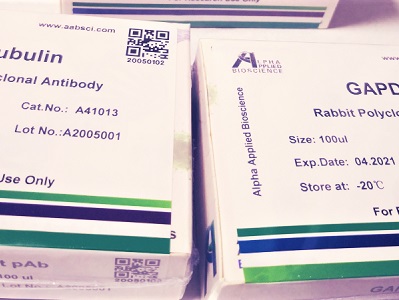

KIR6.2 rabbit pAb
Cat :A16734
-
Source
Rabbit
-
Applications
WB,IHC,IF,ELISA
-
Reactivity
Human,Mouse,Rat
-
Dilution
WB: 1:500 - 1:2000. IHC: 1:100 - 1:300. IF: 1:200 - 1:1000. ELISA: 1:10000. Not yet tested in other applications.
-
Storage
-20°C/1 year
-
Specificity
KIR6.2 Polyclonal Antibody detects endogenous levels of KIR6.2 protein.
-
Source/Purification
The antibody was affinity-purified from rabbit antiserum by affinity-chromatography using epitope-specific immunogen.
-
Immunogen
The antiserum was produced against synthesized peptide derived from human Kir6.2. AA range:190-239
-
Uniprot No
Q14654
-
Alternative names
KCNJ11; ATP-sensitive inward rectifier potassium channel 11; IKATP; Inward rectifier K(+) channel Kir6.2; Potassium channel; inwardly rectifying subfamily J member 11
-
Form
Liquid in PBS containing 50% glycerol, 0.5% BSA and 0.02% sodium azide.
-
Clonality
Polyclonal
-
Isotype
IgG
-
Background
potassium voltage-gated channel subfamily J member 11(KCNJ11) Homo sapiens Potassium channels are present in most mammalian cells, where they participate in a wide range of physiologic responses. The protein encoded by this gene is an integral membrane protein and inward-rectifier type potassium channel. The encoded protein, which has a greater tendency to allow potassium to flow into a cell rather than out of a cell, is controlled by G-proteins and is found associated with the sulfonylurea receptor SUR. Mutations in this gene are a cause of familial persistent hyperinsulinemic hypoglycemia of infancy (PHHI), an autosomal recessive disorder characterized by unregulated insulin secretion. Defects in this gene may also contribute to autosomal dominant non-insulin-dependent diabetes mellitus type II (NIDDM), transient neonatal diabetes mellitus type 3 (TNDM3), and permanent neonatal diabetes mellitus (PNDM). Multiple alternatively spliced trans
-
Other
KCNJ11, ATP-sensitive inward rectifier potassium channel 11
-
Mol.Wt (Da)
43562
-
Concentration
1 mg/ml
| Product | Reactivity | Applications | Conjugation | Catalog | Images |
|---|
-
 400-836-3211
400-836-3211
-
 support@aabsci.com
support@aabsci.com
-
β-actin rabbit pAb ...... >
-
β-actin rabbit pAb(A284) ...... >
-
Plant-actin rabbit pAb ...... >
-
β-tubulin mouse mAb(M7) ...... >
-
GAPDH mouse mAb(2B8) ...... >
-
GAPDH mouse mAb(PT0325) ...... >
-
Histone H3 rabbit pAb ...... >
-
Histone H3 rabbit pAb ...... >
-
COX IV mouse mAb(6C8) ...... >
-
GFP-Tag mouse mAb(1G6) ...... >
-
HA-Tag mouse mAb(1B10) ...... >
-
mCherry-Tag mouse mAb(6B3) ...... >










 400-836-3211
400-836-3211
